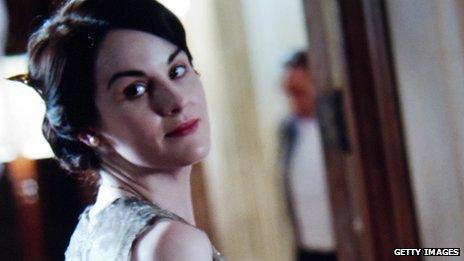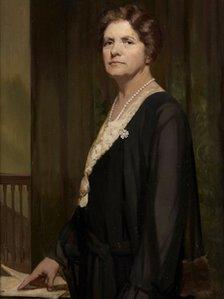The Downton dilemma: Is it time for gender equality on peerages?
- Published

Royal succession laws are changing to stop sons being favoured over daughters. Is it time for the UK's hereditary peerages to go the same way?
Once the Succession to the Crown Bill, currently being fast tracked through Parliament, is passed, men will no longer be automatically the first in line to the throne, ending centuries of discrimination against women.
But while MPs and the government may pat themselves on the back for their progressive credentials in reforming the monarchy, other parts of the British establishment look unlikely to see similar change.
The Peerage of the United Kingdom, which originated in feudal times, still operates in the main along the principle of "male primogeniture" - ie sons, nephews and uncles take precedence over daughters, nieces and aunts when the title is passed on to the next generation.
Set in the early 20th century, the popular ITV drama series Downton Abbey highlighted the problem of what happens when there is no direct male heir - with the Earl of Grantham's title passing to a distant relative he had never met, instead of one of his three daughters.
In much of the aristocracy it is a situation that still endures, with most titles, and the landed estates that go with them, passing to the closest male heir. If there is no male heir, a title can be lost entirely.
There are some cases where women can inherit a peerage, but it is usually when no male heir is present, so still putting male heirs at the front of the queue.
But while Parliament wants to end the practice for the monarchy on the grounds that it discriminates against women, there seems little talk about reform of peerage laws, despite it being a prejudice that has a part to play in Westminster itself.
The House of Lords, which dates back over 600 years, has been, for most of its life, made up exclusively of men and those men, for most of the time, have been those with inherited titles.
Reforms in 1999 saw the vast majority of hereditary peers expelled from the Lords, however a rump of 92 was allowed to stay and remains to this day.
The expulsion was meant to be the first step of a two-stage process to reform the Lords, but the second stage - which would include the removal of hereditaries entirely - has proved famously elusive and hereditary peers in the Lords look set to stay for the foreseeable future.
While the Church of England is looking to allow women bishops - meaning the 26 bishops that sit in the Lords could one day include both men and women - no such moves are being made to tackle the inherent gender inequality of hereditary peers.

Viscountess Rhondda tried to take a seat in the House of Lords in 1922
In a report published in 2011, the Political and Constitutional Reform Committee argued that it was a matter of "public interest" to bring about reform because it had an effect on the gender balance in Parliament.
And it is not a new issue. Ever since women's suffrage, noble women have been agitating for their right to sit alongside their male contemporaries in the Lords.
In 1922, Viscountess Rhondda, an active suffragette in her youth who inherited her title from her father, lost her case to take a seat in the Lords.
The Lords Privileges Committee ruled that no female hereditary peers could sit in the Lords until legislation was passed to expressly allow it.
A number of Private Member's Bills followed, as did motions set down by Lord Astor, the husband of Nancy Astor - the first woman MP - but all failed to get peeresses into the Lords.
It was not until life peers were created in 1958 that any women could sit in the Lords and even then it was another five years before the privilege was extended to female hereditary peers.
Since then the inheritance laws favouring men have kept their numbers down. Between 1963 and 1999, 25 female hereditary peers took their seat in the Lords and of the current crop of 92, only two - Lady Saltoun and the Countess of Mar - are women.
'Jungle of private law'
Since 1999, no female hereditary peer has won one of the by-elections that takes place in the event of the death of an hereditary member and, at the moment, none are registered as wanting to join the Lords.
In the most recent by-election, taking place after the death of Earl Ferrers, 27 hereditary peers put themselves forward - all of them were men.
Experts say that although some hereditary peers still play a part in British public life, the majority do not and making changes to how titles are inherited for hundreds of private families could present practical and legal problems and prove much more complicated than making the change just for the royal family.
Professor Bob Morris, honorary senior research fellow at University College London's Constitution Unit, says it could actually be easier to abolish hereditary peers in the Lords than make changes to male primogeniture.
"If you want to invade this area you will have to deal with a lot private law issues," Professor Morris says.
"There have been a number of arrangements made in private families, sometimes going back generations, and there are the legitimate expectations of heirs. You can imagine what a jungle that could be.
"If you view it purely from the perspective of equality then of course it is not right. But there is a balance between the two arguments."
Lord Lucas, a hereditary peer whose title is one of the few that can be inherited by woman, thinks he has the answer - An "opt-in" system.
Those families who wanted to change the way in which their title is passed down could apply to the Lord Chancellor's office to establish a future line of succession which was gender neutral.
'Not optimistic'
There would be an appeals process to deal with disputes and the change could only be made if "everyone was in agreement", the peer says.
This would avoid forcing the change on families that didn't want it, but it would allow for those who want to make the change to do so.
"I don't see any practical way or need to compel people to make the change. It's a very individual thing and I don't see a reason to cause pain through seeking to do good," he says.
"I come from a background where it was normal that women took their share. Just because Jesus chose the 12 disciples it doesn't mean that everything should be done by men. We should be entitled to change the things that we no longer agree with."
He has received a positive response from some, particularly from those who face their titles dying out through a lack of male heirs, but he knows others are deeply opposed to the change.
"Given Lords reform has gone away for the time being there is an added sharpness to getting more women in," he argues.
"Do I think this government will do anything about it? I just don't think they can be bothered. It is still worth a try, although I am not vastly optimistic about it."
Nick Clegg, who takes a lead in the coalition on constitutional affairs, has recently said he is "sympathetic" to the reform, but as yet there are no signs the government is considering it.
- Published22 January 2013
- Published7 December 2011
- Published3 December 2012